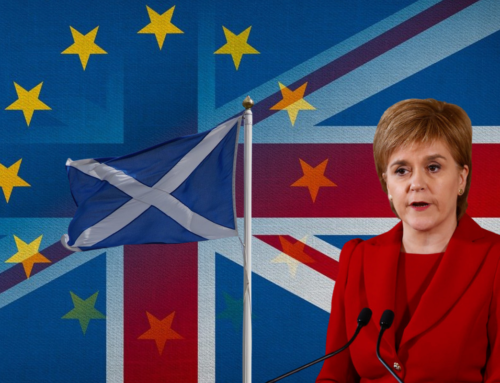by Brendan Donnelly, Director, The Federal Trust
24th January 2018
In recent weeks, there has been widespread discussion of the possibility of a new referendum later in the year to endorse or reject the terms negotiated by Mrs May and her government for British withdrawal from the European Union. A surprising potential supporter of a new referendum has been Nigel Farage. His intervention in the debate, together with the earnest assurances of the Prime Minister that no further European consultation will take place, have convinced many observers of the likelihood, perhaps even inevitability, of a further referendum in the autumn of this year. The case for such a referendum will be strong if Mrs May succeeds in reaching an accord with her EU partners on Brexit. It will be even stronger if she fails to reach any agreement at all.
It is an often-repeated argument of Mrs May and her supporters that if, as is entirely possible, Parliament votes to reject the outcome of her Brexit negotiations, then that will simply lead to the UK’s leaving the EU in March 2019, without an agreement of any kind (‘No Deal Brexit’). Any such rejection by Parliament would therefore have the paradoxical consequence of merely worsening what Parliament would have already deemed unsatisfactory terms for Brexit. This argument has a certain superficial plausibility, given the automaticity of Article 50 of the Lisbon Treaty. But its plausibility can only become reality if Parliament, having rejected the terms for Brexit negotiated (or not negotiated) by the Conservative government, were content to do nothing between the date of this rejection (perhaps in September or October of this year) and March 2019. For the majority of MPs opposed to Brexit, an effective and politically astute way to fill that intervening period would precisely be the holding of a referendum on the negotiated and rejected terms, with a real chance of these terms being rejected by the electorate as well. No government would dare to proceed to leave the Union on these terms in face of rejection by both Parliament and the electorate. Having received contradictory signals on Brexit in successive referendums, it would then be open to Parliament to take back control of the Brexit process either by seeking to prolong the negotiating period foreseen under Article 50 or withdraw the Article 50 notification altogether.
The holding of a referendum on the Brexit terms would be particularly attractive to two important audiences within the House of Commons, namely the great majority of Labour MPs who oppose Brexit and the small minority of Conservative MPs who share that opposition. It is difficult to see how the negotiated Brexit terms can ever meet the criteria laid down by Sir Keir Starmer for Labour to support them. Labour will almost certainly have good grounds for rejecting the proposed Conservative terms for Brexit. A further referendum would enable them to voice this opposition unambiguously, while entrusting a final decision on the matter to the electorate as a whole. Equally, the twenty or thirty Conservative MPs who continue to have fundamental reservations about Brexit might well be attracted by the possibility of a new referendum. Without such a referendum, the only way Brexit can conceivably be prevented is the overthrow of the present Conservative government. This is a great deal to ask of life-long members of the Conservative Party. Kenneth Clarke and those around him will not wish to be seen as those who facilitated Mr. Corbyn’s path to 10 Downing Street.
No Brexit on the rejected terms
If a majority can be constructed in the House of Commons for a further referendum it would be surprising if the necessary legislation and administrative arrangements could not be put in place for a popular vote at the end of 2018 or early in 2019. The question asked would be whether the electorate accepted or rejected the Brexit terms negotiated (or not negotiated) by Mrs May’s government. If they were accepted by the electorate, the UK would leave the EU in March, 2019. If they were rejected, the Conservative government would have a number of choices. It could ask for an extension of the Article 50 negotiating period; it could withdraw the Article 50 notification; it could bring about a new General Election; it could resign; it could be reconstituted as a coalition government. The only option that would no longer be open to it would be simply to leave the EU on 29th March 2019.
Those from the traditional “remain” camp who are hesitant about a new referendum are often hesitant for one of three reasons. They fear that the result of this new plebiscite will be identical to that of June 2016; they fear that any revocation of Article 50 will be subject to unattractive conditions imposed by other members of the EU; or they fear that the nature of the agreement presented to the Commons later this year will be so vague as to make inappropriate a further referendum on it. In regard to the first concern, there can obviously be no guarantee as to the outcome of a new referendum. But public opinion has been moving consistently, if slowly against Brexit in recent months. There is good reason to suppose that this evolution of opinion will continue as negotiations with the EU make ever clearer the damaging economic consequences of Brexit. Nor is it obvious that our partners in the EU would have any desire to put unnecessary obstacles in the way of any British decision to revoke the Article 50 notification. It is not even legally clear that they would be entitled to do so.
No more eating eaten cake
More serious on the other hand is the concern that if an agreement is concluded in the autumn of this year, it will be insufficiently precise to form the basis of a rational further plebiscite. Michel Barnier has spoken of this agreement as containing detailed provisions for British withdrawal from the EU, but only a general political declaration about the UK’s future trading relationship with the Union. It is true that the details of the UK’s future trading relationship with the EU will need to be worked out over a number of years, probably extending beyond the proposed ending of the standstill period at the end of 2020. But the EU will insist as a precondition for granting the UK this standstill period clarity about the nature of the future relationship between the UK and the EU that is eventually in prospect. It will not be sufficient for the British government to speak glibly about a future special or bespoke relationship. Any document agreed between the EU and the UK will make much clearer than has ever been the case until now that the United Kingdom emphatically cannot have its cake and eat it. The nature of the trade-offs in which the UK must engage will be clear for all to see. It was only possible for the “Leave” side to win the referendum of 2016 by the most brazen denying of the need for such trade-offs. A referendum fought about the real implications of Brexit has every chance of generating a very different result in 2018 from that obtained by wishful thinking and deception in 2016.
If the House of Commons is to endorse a referendum later in the year, it is clear that both the majority of Labour MPs and the minority of Conservative MPs will need to move beyond their present political positions. Despite his well-advertised dislike for the European Union, Mr. Corbyn would be taking a considerable and avoidable political risk if he simply allowed a Conservative Brexit to be inflicted on the country with only rhetorical opposition to it from the Labour Party. There are the beginnings of organization and dissent within the Conservative Parliamentary Party that could well find increasingly effective expression as the year unfolds. This dissident current of opinion might well be sufficient to ensure a narrow Parliamentary majority against whatever terms Mrs May is able to negotiate.
A new Conservative leader?
If there is a further referendum, the intriguing question poses itself of who will be the leader of the Conservative Party during it. It seems very unlikely that the Conservative Party would continue to tolerate Mrs May as its leader in such circumstances. The Party would naturally wish to be led by a more attractive and persuasive figure, above all by a political leader convinced of the merits of Brexit. There are many respects in which this would be a useful and cleansing clarification of the political landscape. Mrs May has on a number of occasions recently refused to specify how she would vote in a new referendum. That the British government has been led over the past eighteen months in the perilous adventure of Brexit by a Prime Minister who clearly realizes the damage this reckless venture may impose on her country, but feels powerless to prevent it, has been a personal humiliation for her and exposed this country to scorn and ridicule abroad. Michael Heseltine supposedly advised Mrs May to ensure that the Brexit negotiations were largely carried out by Conservative ministers supportive of Brexit. In that the public prestige of ministers such as Boris Johnson, Liam Fox and David Davis has been reduced by their clumsy negotiating efforts, Lord Heseltine’s advice may well have been prescient. A new referendum would ensure that this sound advice was applied to the Conservative Premiership as well.
Not the least of the ironies of Brexit is that if Boris Johnson had been in charge of the Brexit negotiations over the last eighteen months, the whole implausible project might well have collapsed long ago under the weight of its own contradictions, contradictions he would have exacerbated by his self-absorbed carelessness. It is debatable whether Mrs May has served her party well since she became Prime Minister. Her relative success in keeping the project of Brexit just about alive until now has certainly not served the country well. A distinguished predecessor of Mrs May, Sir Winston Churchill, described his eventual return to the Conservative Party after leaving them for the Liberals before the First World War as “ratting and then reratting.” If there is a new referendum on Brexit, Mrs May, deposed from the Conservative leadership, will have the opportunity of following this Churchillian example. The already rich tragi-comedy of Brexit would be further enhanced by the spectacle of Mrs May as a (no doubt tepid) opponent in the coming referendum of the Brexit agreement she had herself signed.








[…] http://fedtrust.co.uk/a-new-referendum-but-this-time-about-reality/ […]
[…] Source: The case for a new British referendum on the EU is becoming unstoppable | The Federal Trust […]
[…] earlier version of this post appeared on The Federal Trust and it represents the views of the author and not those of the Brexit blog, nor the […]